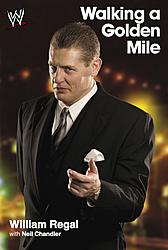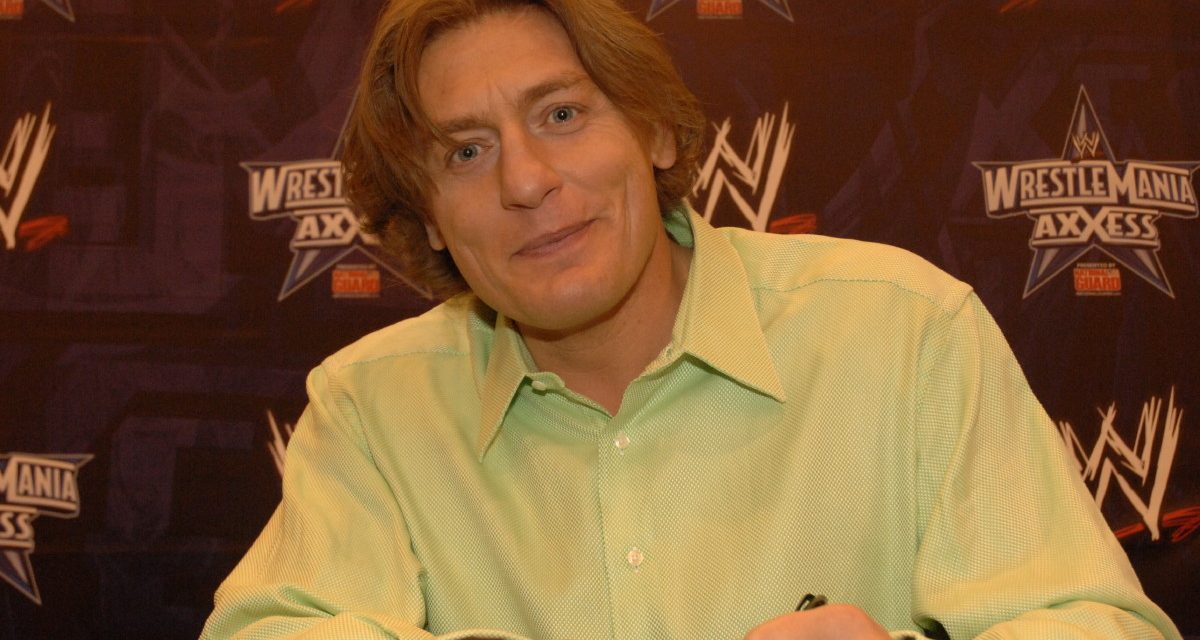Like his short tenure in a WWE faction, William Regal’s new book, Walking a Golden Mile, is decidedly Un-American. This isn’t to say that it is anti-American; instead the book resists the urge to dumb it down for the U.S. audience.

Full of British terms and slang and references to comedians and shows from the telly known only to the most hardcore Britophile, Walking a Golden Mile, written with Neil Chandler, is both a jolly entertaining read and a terrifying descent into one man’s battles with drug addiction and alcohol.
To say the least, in his 37 years, Darren Matthews (aka William Regal, Steven Regal) has gone through a lot.
He starts the reader off right at the bottom of the Prologue, explaining how he absolutely ruined a family Christmas in England in 1998, just after he’d signed with the WWF. “And it was exhausting, staggering around Blackpool trying to catch up with my old friends,” Regal writes. “Buying wraps of speed — amphetamine sulphate — seemed to be the only way to keep going.” Shortly thereafter, he was in rehab, attempting to get his life together.
More of the harrowing tales of fighting his demons, questioning the medical profession and trying to regain his life follow in the book, but further along.
Walking a Golden Mile returns to a linear timeline for the first chapter, taking us through his early days as Darren Matthews, breaking into wrestling in England and his first opportunities to go abroad on the continent and improve at his new craft. He draws vivid images of some of the blokes he worked with there, and tries his best to explain how the British pro wrestling circuit worked in its day.
In September 1991, Regal got an invite to tryout for the WWF, but it would be in WCW shortly thereafter where he’d make his name known to a larger audience as Lord Steven Regal. His stories of working out of Atlanta, with bookers Bill Watts and Ole Anderson are good, but often leave one wanting more detail. It’s not that his career is glossed over, because it isn’t. Instead, Regal takes the high road and never really slams anybody, and doesn’t dish out dirt. At times, it feels like he’s actually kissing up to recent-day powerbroker Triple H, whom he mentored in WCW with the first run of the Blue Bloods.
Sure, there are funny stories and some good insight. His view on the WCW European tour where Arn Anderson and Sid Vicious ended up fighting with scissors is especially good reading, with some great Nasty Boys tales from the “B” bus. He talks about his forgettable second run in WCW, where he was relegated to working WCW Saturday Night, booked by Jimmy Hart, while ignored by Nitro and Thunder, which were booked by Vince Russo.
But given that he’s still in the business, this isn’t a tell-all, except with his dependency problems. Regal leaves no stone unturned and is completely open with his drug and alcohol problems, and the issues it created with family, friends and co-workers. He blames no one but himself, and offers thanks to those people who helped him out of his deep hole.
Simply put, you will never look at the character William Regal the same way after reading this book, and you will have a much greater appreciation for both the trials and tribulations of being on the road, and the pain that these athletes endure in order to entertain.
Though this is a WWE book, his career in the ‘Fed really only makes up a minor portion of the book, which is somewhat appropriate given how long he has been wrestling. He talks about the bad — The Man’s Man gimmick, which he hated — and the good, like his associations with the Un-Americans (especially his teaming with Lance Storm) and Eugene (Nick Dinsmore). Personally, I wanted more on the mysterious Tajiri, but ’twas not to be.For all the good in the book, it is somewhat ruined by the lame layout. Like the style of recent WWE books from their imprint, it’s full of black-and-white photos and countless pages that are just pullout quotes. So don’t be fooled by the 320-page count; it’s bulked up by at least 70 pages. Then there are the Union Jacks with pullout quotes on them scattered throughout, which totally throw the reader off, especially when, for some daft reason, every so often a paragraph starts with an almost identical, larger font as the pullouts.
Maybe it’s one author standing up for another, but I would liked to have seen some sort of acknowledgement, like a brief bio on the flap or at the back of the book, of his co-writer Chandler. One would have to assume he was someone Regal knew to be able to open up so completely.
And, while it’s a common theme for my reviews, why no index? The flip side to that, however, is the inclusion of a glossary, which Regal introduces in pompous, heel-style. It hankers back to his days trying to make a better man out of Alabama’s Bobby Eaton in WCW: “It has come to my attention that many of my American fans unfortunately have difficulty speaking the Queen’s English. In order to continue my education of the American people, for which I know they are very grateful, here is a guide to some of the terms, phrases, people and places referred to in the book.”
But getting back to the Britishness of this book, members of the Dominion of Canada should have little trouble with the terminology, but our American friends, well, let us know how it goes, y’all. The glossary could really come in helpful.
RELATED LINK

